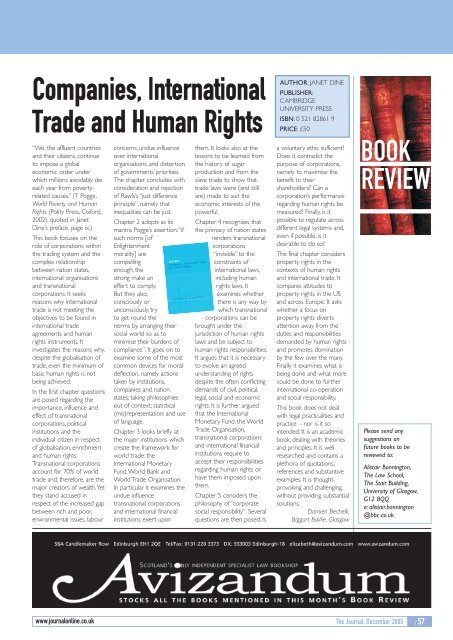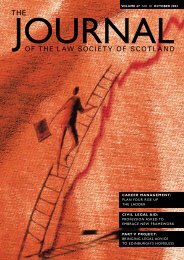Coulsfield reports civil justice as ripe for review Coulsfield reports ...
Coulsfield reports civil justice as ripe for review Coulsfield reports ...
Coulsfield reports civil justice as ripe for review Coulsfield reports ...
You also want an ePaper? Increase the reach of your titles
YUMPU automatically turns print PDFs into web optimized ePapers that Google loves.
Companies, International<br />
Trade and Human Rights<br />
“We, the affluent countries<br />
and their citizens, continue<br />
to impose a global<br />
economic order under<br />
which millions avoidably die<br />
each year from povertyrelated<br />
causes.” (T Pogge,<br />
World Poverty and Human<br />
Rights (Polity Press, Ox<strong>for</strong>d,<br />
2002), quoted in Janet<br />
Dine’s preface, page ix.)<br />
This book focuses on the<br />
role of corporations within<br />
the trading system and the<br />
complex relationship<br />
between nation states,<br />
international organisations<br />
and transnational<br />
corporations. It seeks<br />
re<strong>as</strong>ons why international<br />
trade is not meeting the<br />
objectives to be found in<br />
international trade<br />
agreements and human<br />
rights instruments. It<br />
investigates the re<strong>as</strong>ons why,<br />
despite the globalisation of<br />
trade, even the minimum of<br />
b<strong>as</strong>ic human rights is not<br />
being achieved.<br />
In the first chapter questions<br />
are posed regarding the<br />
importance, influence and<br />
effect of transnational<br />
corporations, political<br />
institutions and the<br />
individual citizen in respect<br />
of globalisation, enrichment<br />
and human rights.<br />
Transnational corporations<br />
account <strong>for</strong> 70% of world<br />
trade and, there<strong>for</strong>e, are the<br />
major creators of wealth.Yet<br />
they stand accused in<br />
respect of the incre<strong>as</strong>ed gap<br />
between rich and poor,<br />
environmental issues, labour<br />
www.journalonline.co.uk<br />
concerns, undue influence<br />
over international<br />
organisations, and distortion<br />
of governments’ priorities.<br />
The chapter concludes with<br />
consideration and rejection<br />
of Rawls’s “just difference<br />
principle”, namely that<br />
inequalities can be just.<br />
Chapter 2 adopts <strong>as</strong> its<br />
mantra Pogge’s <strong>as</strong>sertion:“if<br />
such norms [of<br />
Enlightenment<br />
morality] are<br />
compelling<br />
enough, the<br />
strong make an<br />
ef<strong>for</strong>t to comply.<br />
But they also,<br />
consciously or<br />
unconsciously, try<br />
to get round the<br />
norms by arranging their<br />
social world so <strong>as</strong> to<br />
minimise their burdens of<br />
compliance”. It goes on to<br />
examine some of the most<br />
common devices <strong>for</strong> moral<br />
deflection, namely actions<br />
taken by institutions,<br />
companies and nation<br />
states; taking philosophies<br />
out of context; statistical<br />
(mis)representation; and use<br />
of language.<br />
Chapter 3 looks briefly at<br />
the major institutions which<br />
create the framework <strong>for</strong><br />
world trade: the<br />
International Monetary<br />
Fund,World Bank and<br />
World Trade Organisation.<br />
In particular it examines the<br />
undue influence<br />
transnational corporations<br />
and international financial<br />
institutions exert upon<br />
them. It looks also at the<br />
lessons to be learned from<br />
the history of sugar<br />
production and from the<br />
slave trade to show that<br />
trade laws were (and still<br />
are) made to suit the<br />
economic interests of the<br />
powerful.<br />
Chapter 4 recognises that<br />
the primacy of nation states<br />
renders transnational<br />
corporations<br />
“invisible” to the<br />
constraints of<br />
international laws,<br />
including human<br />
rights laws. It<br />
examines whether<br />
there is any way by<br />
which transnational<br />
corporations can be<br />
brought under the<br />
jurisdiction of human rights<br />
laws and be subject to<br />
human rights responsibilities.<br />
It argues that it is necessary<br />
to evolve an agreed<br />
understanding of rights<br />
despite the often conflicting<br />
demands of <strong>civil</strong>, political,<br />
legal, social and economic<br />
rights. It is further argued<br />
that the International<br />
Monetary Fund, the World<br />
Trade Organisation,<br />
transnational corporations<br />
and international financial<br />
institutions require to<br />
accept their responsibilities<br />
regarding human rights or<br />
have them imposed upon<br />
them.<br />
Chapter 5 considers the<br />
philosophy of “corporate<br />
social responsibility”. Several<br />
questions are then posed. Is<br />
AUTHOR: JANET DINE<br />
PUBLISHER:<br />
CAMBRIDGE<br />
UNIVERSITY PRESS<br />
ISBN: 0 521 82861 9<br />
PRICE: £50<br />
a voluntary ethic sufficient?<br />
Does it contradict the<br />
purpose of corporations,<br />
namely to maximise the<br />
benefit to their<br />
shareholders? Can a<br />
corporation’s per<strong>for</strong>mance<br />
regarding human rights be<br />
me<strong>as</strong>ured? Finally, is it<br />
possible to regulate across<br />
different legal systems and,<br />
even if possible, is it<br />
desirable to do so?<br />
The final chapter considers<br />
property rights in the<br />
contexts of human rights<br />
and international trade. It<br />
compares attitudes to<br />
property rights in the US<br />
and across Europe. It <strong>as</strong>ks<br />
whether a focus on<br />
property rights diverts<br />
attention away from the<br />
duties and responsibilities<br />
demanded by human rights<br />
and promotes domination<br />
by the few over the many.<br />
Finally it examines what is<br />
being done and what more<br />
could be done to further<br />
international co-operation<br />
and social responsibility.<br />
This book does not deal<br />
with legal practicalities and<br />
practice – nor is it so<br />
intended. It is an academic<br />
book, dealing with theories<br />
and principles. It is well<br />
researched and contains a<br />
plethora of quotations,<br />
references and substantive<br />
examples. It is thoughtprovoking<br />
and challenging,<br />
without providing substantial<br />
solutions.<br />
Damien Bechelli,<br />
Biggart Baillie, Gl<strong>as</strong>gow<br />
BOOK<br />
REVIEW<br />
Ple<strong>as</strong>e send any<br />
suggestions on<br />
future books to be<br />
<strong>review</strong>ed to:<br />
Alistair Bonnington,<br />
The Law School,<br />
The Stair Building,<br />
University of Gl<strong>as</strong>gow,<br />
G12 8QQ<br />
e: alistair.bonnington<br />
@bbc.co.uk<br />
The Journal: December 2005 : 57










